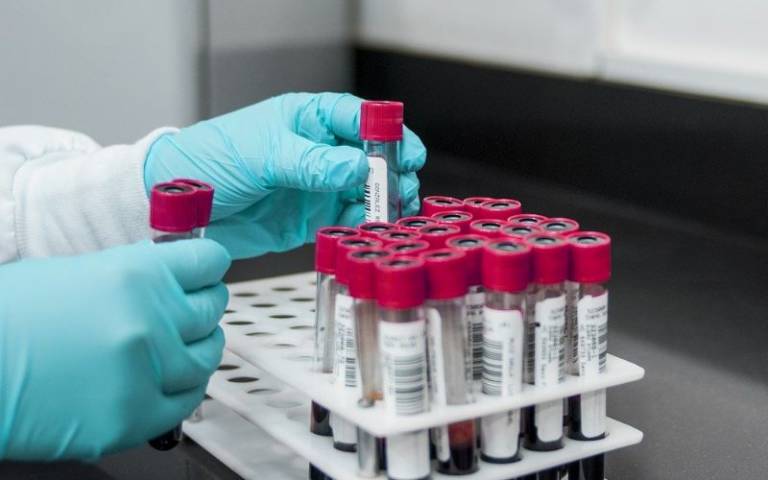Validation of disease indicator could substantially change cancer clinical practice
22 June 2021
Presence of tumour DNA in the blood – a biomarker or indicator of disease first identified by UCL scientists – can predict which cancer patients are most likely to relapse after having a tumour surgically removed and most likely to benefit from immunotherapy.

The findings published in Nature mean in future there could be a substantial change in cancer clinical practice, with immunotherapy only given where there is residual disease after surgery, meaning treatment would be more personalised.
Use of personalised cancer fingerprints to identify the presence of circulating tumour DNA (ctDNA) was identified* as a possible biomarker of disease by the TRACERx (TRAcking Cancer Evolution through therapy (Rx)) research consortium in 2017.
TRACERx involves researchers from UCL, the Francis Crick Institute, UCLH and Cancer Research UK in collaboration with industry-partners Natera and led by Professor Charles Swanton (UCL Cancer Institute, the Crick, and UCLH). Dr Chris Abbosh (UCL Cancer Institute) led the circulating tumour DNA study.
Having identified the biomarker, scientists thought presence of ctDNA in the blood could predict which patients would relapse post-surgery. This latest research validates this idea.
Importantly presence of ctDNA can be identified before any evidence of a relapse can be found via imaging. And it can be collected non-invasively from a single blood draw.
In the latest research, a team led by Professor Tom Powles from Barts Cancer Institute, showed that ctDNA can identify which patients with urothelial carcinoma – a cancer of the urinary system – are most at risk of relapse, and who may benefit most from therapy with a monoclonal antibody called atezolizumab after surgery.
The researchers analysed results of a clinical trial published earlier this year called IMvigor010 in which some patients with urothelial cancer were given atezolizumab. The IMvigor010 trial did not find significant benefit in use of the drug. Patients in the trial had been randomly assigned either to receive atezolizumab or not.
But when researchers in this latest study analysed the findings of the IMvigor010 trial in detail, they found that presence of ctDNA soon after cancer surgery was associated with relapse, and that for patients positive for ctDNA shortly after surgery, atezolizumab improved survival rates.
The research team also reported supporting findings from a separate 2019 study called ABACUS in which atezolizumab was associated with a reduction of ctDNA levels.
More research is needed, but if the findings from the latest research are validated across tumour types, it could lead to a significant change in practice across cancer care.
Commenting on the latest findings Dr Abbosh said: “The observation that ctDNA discriminated a group of patients who benefited from post-operative immunotherapy from those who do not receive benefit is a game-changer for adjuvant cancer medicine. This success indicates the important role biomarker studies such as TRACERx have in developing and validating technologies capable of directly impacting patient care."
TRACERx (Tracking Cancer Evolution through Therapy) is the first study to look at the evolution of cancer in real time and immense detail. Researchers are following patients all the way from diagnosis through to either disease relapse or cure after surgery, tracking and analysing how their cancer develops.
Links
- Research published in Nature
- Professor Charles Swanton’s academic profile
- Dr Chris Abbosh's academic profile
- UCL Cancer Institute
- Cancer Evolution and Genome Instability Laboratory
- The Francis Crick Institute
- CRUK’s TRACERx funded study
Image
‘Lab experiment test’ Credit, fernandozhiminaicela on Pixabay CC BY 2.0
Media contact
Henry Killworth
Tel: +44 (0) 7881 833274
E: h.killworth [at] ucl.ac.uk
 Close
Close

